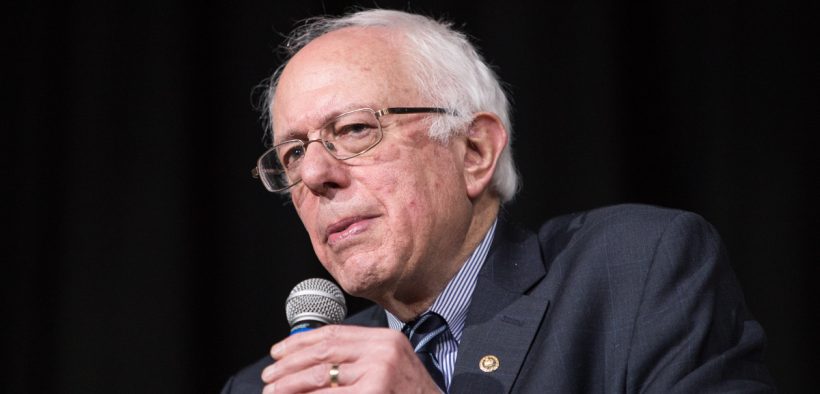AOC And Bernie Sanders Introduce Bill To Cap Credit Card Debt At 15%

“There is no reason a person should pay more than 15% interest in the United States. It’s common sense – in fact, we had these Usury laws until the 70s.”
Representative Alexandria Ocasio-Cortez and 2020 Democratic hopeful Bernie Sanders have teamed up for a new plan to cut credit card fees for consumers. The proposal, called the “Loan Shark Prevention Act,” would cap interest rates at 15%. The initiative will likely ignite a fierce debate with the financial services industry, which gained more than $113 billion last year from consumers in credit card fees and interest at rates far higher than the proposed cap.
“Today’s loan sharks wear expensive suits and work on Wall Street, where they make hundreds of millions of dollars in total compensation by charging sky-high fees and usurious interest rates,” the progressive pair said in a statement.
As Axios’ Orion Rummler explains, credit card debt has been rapidly growing for Americans in recent years; “U.S. card holders are expected to pay $122 billion in interest charges in 2019. That’s 12% more than what they paid in 2017 and 50% more than what they paid as recently as 2014.” According to the Federal Reserve, Americans now have more than $1 trillion in credit card debt.
Ted Rossman, an analyst with CreditCards.com, told the Washington Post that rates have rising fastest for people with low credit scores, “Issuers are taking an opportunity to charge people with lesser credit a bit more.” The median interest rate is currently around 21.36 percent, while for those with poor credit scores it is around 24.99 percent.
Ocasio-Cortez will introduce the House version of the bill while Sanders proposes the Senate version, which has little chance of passing in the Republican controlled Senate. Analysts at Cowen Research Group, however, believe the push could gain bipartisan support by winning ideological support from Republicans in granting states the autonomy to set their own caps lower than 15%.
“The progressive attack is organized and there are multiple paths for them to achieve victory. It is why we believe this is a risk that is worth monitoring,” Jaret Seiberg, an analyst with Cowen, told the Washington Post.
As the Intercept’s David Dayen notes, Sanders and Ocasio-Cortez’ legislation would nullify a 1978 Supreme Court decision that canceled state usury laws. The 1978 dispute of Marquette National Bank v. First of Omaha Service Corp was about credit card offers made over state lines, and whether the borrower or bank’s home-state interest rate applied. The court chose the bank’s home state, which enticed some states, such as Delaware and South Dakota, to lift their usury laws entirely to attract major banks. Banks in states like Delaware could then send high-interest credit cards out throughout the country, ignoring other states’ usury laws.
“There is no reason a person should pay more than 15% interest in the United States. It’s common sense – in fact, we had these Usury laws until the 70s. (Max interest rates are record-high for ppl with excellent credit, too.) It’s a debt trap for working people + it has to end,” Ocasio-Cortez wrote on Twitter.
Opponents of the legislation argue it would hurt low-credit consumers by limiting their ability to access credit. As American Bankers Association spokesperson Jeff Sigmund argued:
“Today consumers benefit from a highly competitive and vibrant credit market. It would be a mistake for the government to artificially limit those choices. This specific proposal will only harm consumers by restricting access to credit for those who need it the most and driving them toward less regulated, more costly alternatives.”
AOC and Bernie Sanders’ seem to have anticipated this problem, as another major aspect of their proposal is postal service banking, which would allow the nation’s 31,000 postal offices to provide basic financial services to the American public. Like state usury laws, postal banking used to be part of America’s financial system, in place from 1911-1967. As the Nation’s John Nichols explains, post offices in prosperous countries like Japan, Germany, China, and South Korea provide banking services.
American Postal Workers Union president Mark Dimondstein argues the USPS can and should provide “a nonprofit alternative to the big banks” that “would give the working poor an alternative to the legal loan-sharking they are now victimized by.” Critics of the proposal, such as Reason’s Peter Suderland, argue the USPS is struggling with insolvency and couldn’t handle the burden of providing financial services to Americans with poor credit.
The Loan Shark Prevention Act may not pass, but it will likely change the conversation around exorbitant credit card fees and move the political needle. At a time of increased scrutiny of corporate donations in campaign financing, it could also draw attention to Wall Street’s influence on major 2020 candidates like Joe Biden, who was called the “senator from MBNA” for his close ties to the credit card company that was bought by Bank of America.
“We must make sure that giant Wall Street financial institutions are not the only way Americans can gain access to banking services,” the Sanders and Ocasio-Cortez statement reads. “Together, we are going to put predatory lenders out of business and provide affordable banking options to all Americans.”















